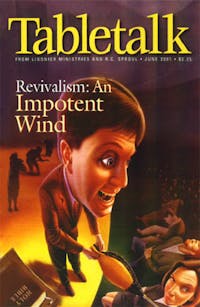
Request your free, three-month trial to Tabletalk magazine. You’ll receive the print issue monthly and gain immediate digital access to decades of archives. This trial is risk-free. No credit card required.
Try Tabletalk NowAlready receive Tabletalk magazine every month?
Verify your email address to gain unlimited access.
When I began my teaching career at the college level, I came across a sermon that Jonathan Edwards had written. It was titled “A Warning to Professors.” Since I was a new college professor, I was certain the sermon was directed at me. Indeed it was, but not for the reason that I supposed.
The “professors” Edwards had in mind in this sermon were not college professors or indeed any members of the teaching caste in the academic world. Rather, he was speaking of those who were professors of Christ, those who had made outward professions of faith.
All Christians are called to profess Christ before men. Most, if not all, churches require some kind of public profession from a person seeking to become a member of the congregation. Such public profession is a duty of every Christian. But this duty is not what makes a person a Christian.
The church is a corpus per mixtum, a “mixed body,” where tares grow among the wheat and goats frolic among the sheep. The tares and the goats are those who honor Christ with lip service while their hearts are far from Him. But they will not be able to disguise their true state forever. Jesus’ most dreadful warning may well be that given as part of the conclusion of the Sermon on the Mount. He said:
“ ‘Not everyone who says to Me, “Lord, Lord,” shall enter the kingdom of heaven, but he who does the will of My Father in heaven. Many will say to Me in that day, “Lord, Lord, have we not prophesied in Your name, cast out demons in Your name, and done many wonders in Your name?” And then I will declare to them, “I never knew you; depart from Me, you who practice lawlessness! ” ’ ” (Matt. 7:21–23).
In light of this frightening declaration, perhaps we should re-title this sermon, changing it from “The Sermon on the Mount” to “A Warning to Professors.” After all, Edwards’ warning was but a footnote to this warning from our Lord Himself.
Edwards focused on people who made a profession of faith, joined the church, and participated in worship, but continued to live godless lives. They were the “carnal Christians” of his day, professing faith in Jesus as Savior but not submitting to Him as Lord. But as Jesus warned in His sermon, no one can be His and simultaneously be a lawless person.
To be sure, we are justified by faith alone while we are still sinners, but it is also true that faith without works is dead and that a faith that yields no fruit of obedience will justify no one. True saving faith always and everywhere manifests itself in fruit. The absence of fruit is proof positive of the absence of faith.
We can have a profession of faith without fruit but never the possession of faith without fruit.
There is a great danger inherent in modern techniques of evangelism. We can become so zealous to win souls for Christ that we can try to “prime the pump,” as it were. We can encourage people to make some demonstrable outward response to the preaching of the Gospel. We might ask people to walk forward, to raise a hand, to sign a card, or to recite the “sinner’s prayer.”
These techniques are not inherently wrong. But they are dangerous and should be used only with prudence. It is all too easy to put so much emphasis upon the external techniques that we “count” every profession of faith as a genuine conversion. This can puff up our statistics and our confidence in the efficacy of our ministries. That is bad, but not nearly so bad as giving assurance to someone who has made a false profession of faith. It’s bad that we count such a profession as a conversion. It is far worse if the person counts it as a conversion and is given a false sense of security while still outside the kingdom of God.
We must look beyond our methods and our techniques to where the real efficacy of evangelism may be found. It is in the power of the Gospel as it is attended by the ministry of the Holy Spirit. That power is not found in the eloquence of the preacher, the force of his rhetoric, or even in the cogency of his argument. The power is in the Gospel. I can preach it. But I cannot effect its increase. That work belongs to God, who alone has the power to revive a single soul.
